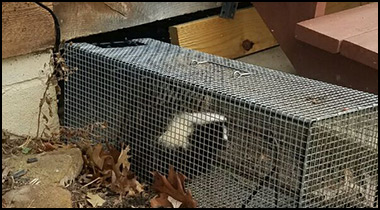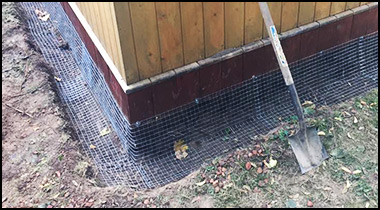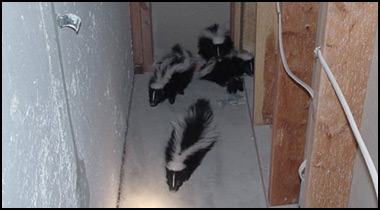South Bend Skunk Removal Resources
Skunk Rehabber - South Bend Animal Care and Control: (574) 235-9303
Free Saint Joseph County Animal Services: 574-255-4726
Humane Wildlife Trappers of South Bend: 574-376-2930
If you need skunk control in South Bend, you have a few options. First, you can attempt to solve the skunk problem yourself by reading our do-it-yourself guide. If you need outside help, you can also call Saint Joseph County Animal Services to see if they have any free resources or help for you - however, they primarily deal with dog and cat concerns. You can also call a local South Bend wildlife rehabber, as they are typically a great resource for advice that is in the best welfare of the animal. If as a last resort you must hire a professional company, we recommend Humane Wildlife Trappers of South Bend at 574-376-2930. To learn more about them or check their skunk removal prices, visit southbendpestanimal.com.

South Bend Skunk Trapping and Removal

Preventative Repairs & Exclusion

South Bend Skunk Removal From Structures
In many cases, preventative measures can solve your South Bend skunk problem - keep garbage secured, pet food indoors, and most of all when it comes to skunks, secure the perimeter of your shed, porch, deck, or house with a barrier - lattice or steel mesh is good, and it keeps Indiana skunks from going under the structure. If trapping and removal of the skunk is the only option you have, please do so with the help of a local agency or professional company who knows how to do it humanely and legally. Browse the resources of this site for more educational information.
Frequently Asked Questions:
Prevention: How to Keep Skunks Away
What to do with a skunk after I catch it?
Is it legal for me to trap a skunk?
How to remove skunk odor
Is a skunk active during the daytime rabid?
What does skunk feces look like?
South Bend Skunk Control Information: Does baby or juvenile skunks spray?
Almost everyone recognizes the distinctive black and white pattern of a skunk. An adult skunk does not normally fear other animals because of its unique defense mechanism. . The odiferous musk that a skunk sprays from those highly developed anal glands under its tail is such a great defense that grown skunks hardly ever get killed by other animals. There are a few animals, only if starving, will eat a skunk if it has to. There are a few types of owls that will eat skunks. Owls have almost no sense of smell and hunt at night so they could be the skunk's greatest adversary.
Other than during birthing and child rearing, a female skunk is a pretty calm creature that tends to go about their crepuscular lives paying little attention to other animals. They only pay any attention to other creatures if they perceive they are being threatened. At this point, all skunks, young or old, will proceed in raising their tail, then they will stomp their fore feet, double over in a horseshoe -shape so as to stare down the oncoming threat. They will then aim the working end of the musk filled glands under their tale. . While this is not an effective defense against cars or other inanimate objects, it will serve to cause other animals to flee. A truly offended skunk will sometimes chase the fleeing intruders.
Keep in mind that a skunk can run almost the same speed as a frightened person! This can lead to some pretty scary encounters in the dark! If you encounter skunks babies, you have little to fear from them. Until the young skunks are 8 days old they cannot emit any type of musk. In fact, they are completely unable to defend themselves by spraying until they are over a month old. Just keep in mind, that if you see a batch of skunk babies, while they might be fairly defenseless, mama is hiding nearby and she will fight to the death to protect her young!! Young or old, the best tact to take when dealing with skunks is to give them as wide a berth as possible
Remember, for free services you can try (574) 235-9303 or 574-255-4726, but if you need to pay for professional help, check the prices at the southbendpestanimal.com website. Or follow our do-it-yourself guide!

